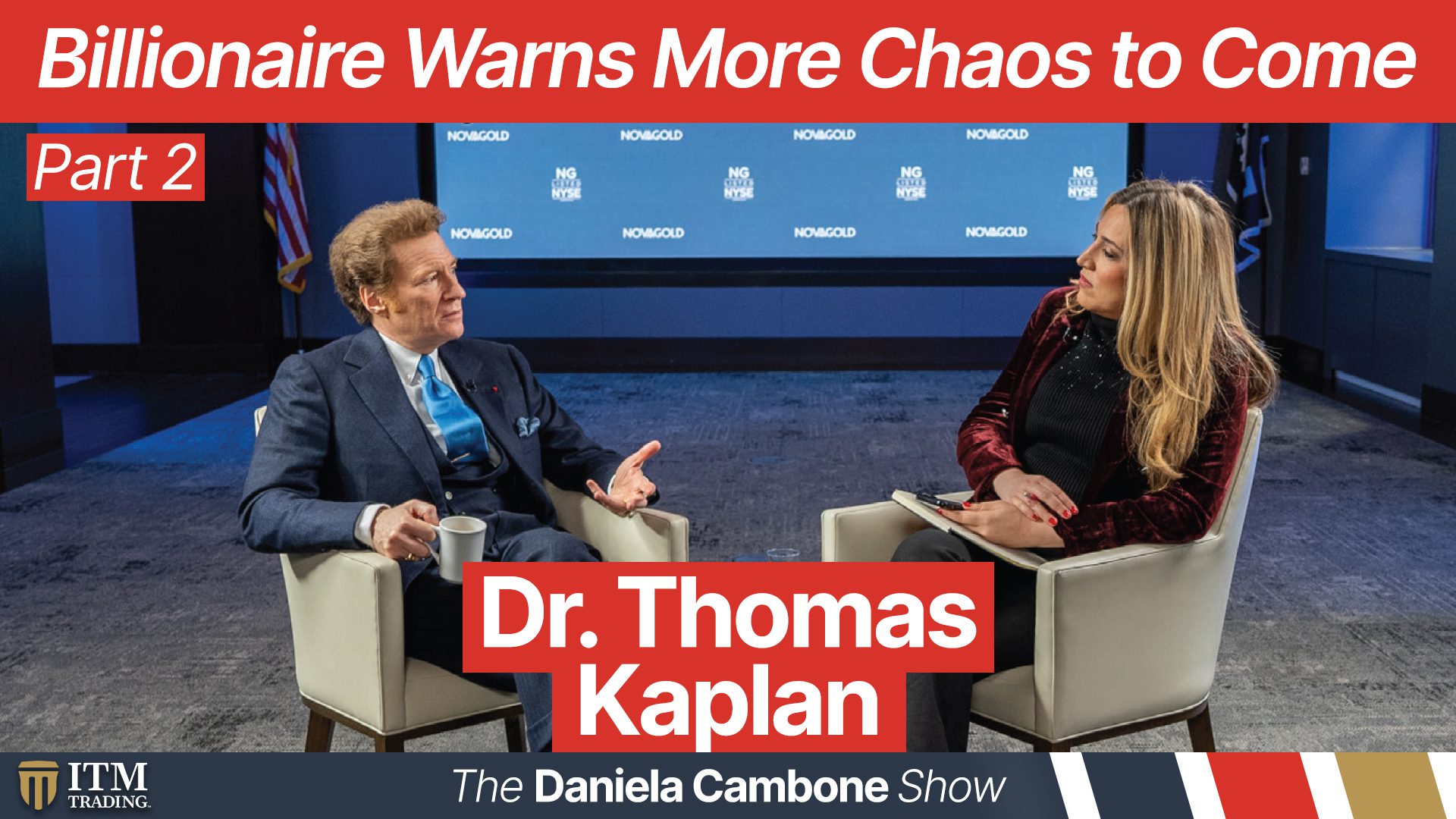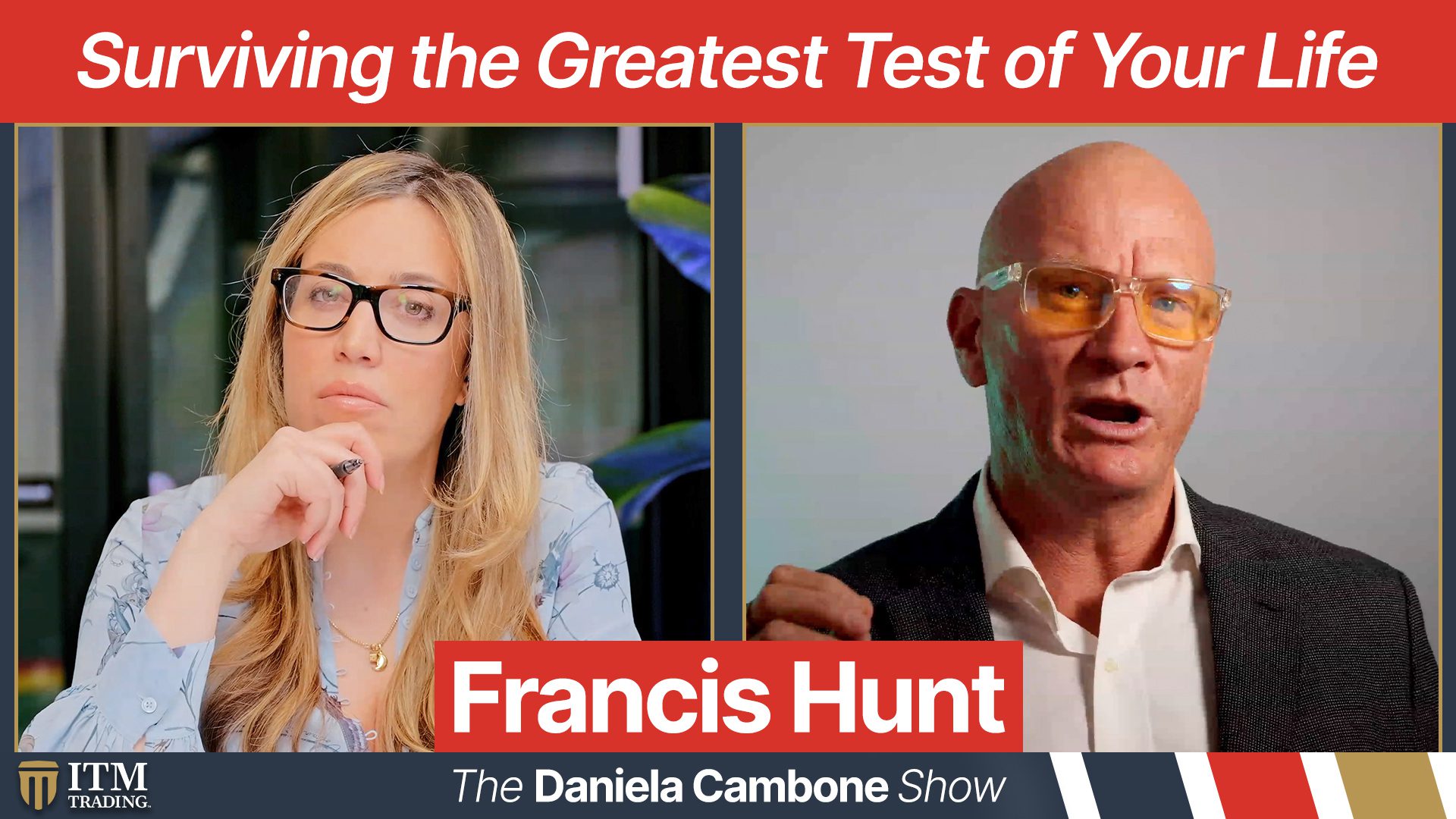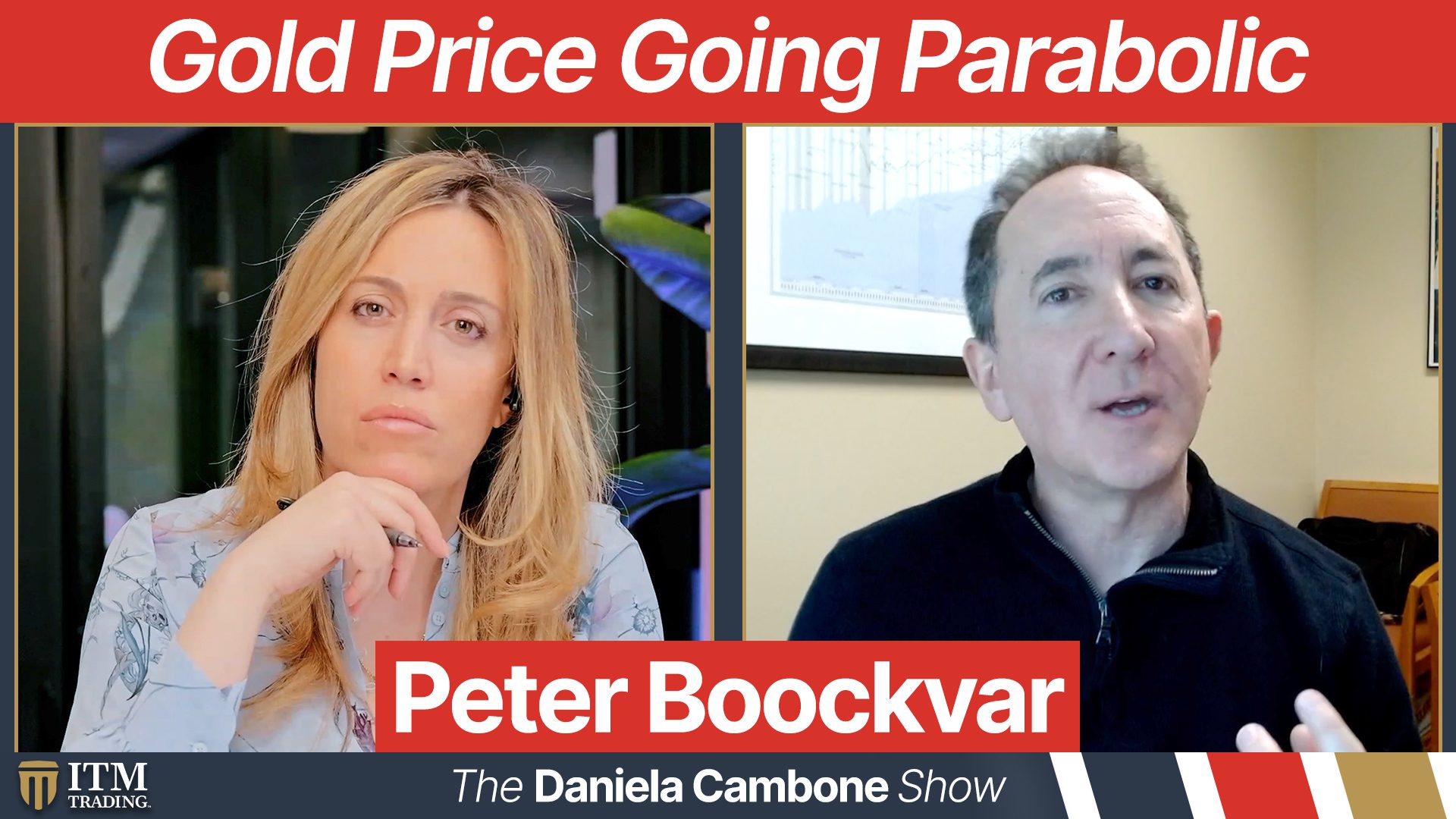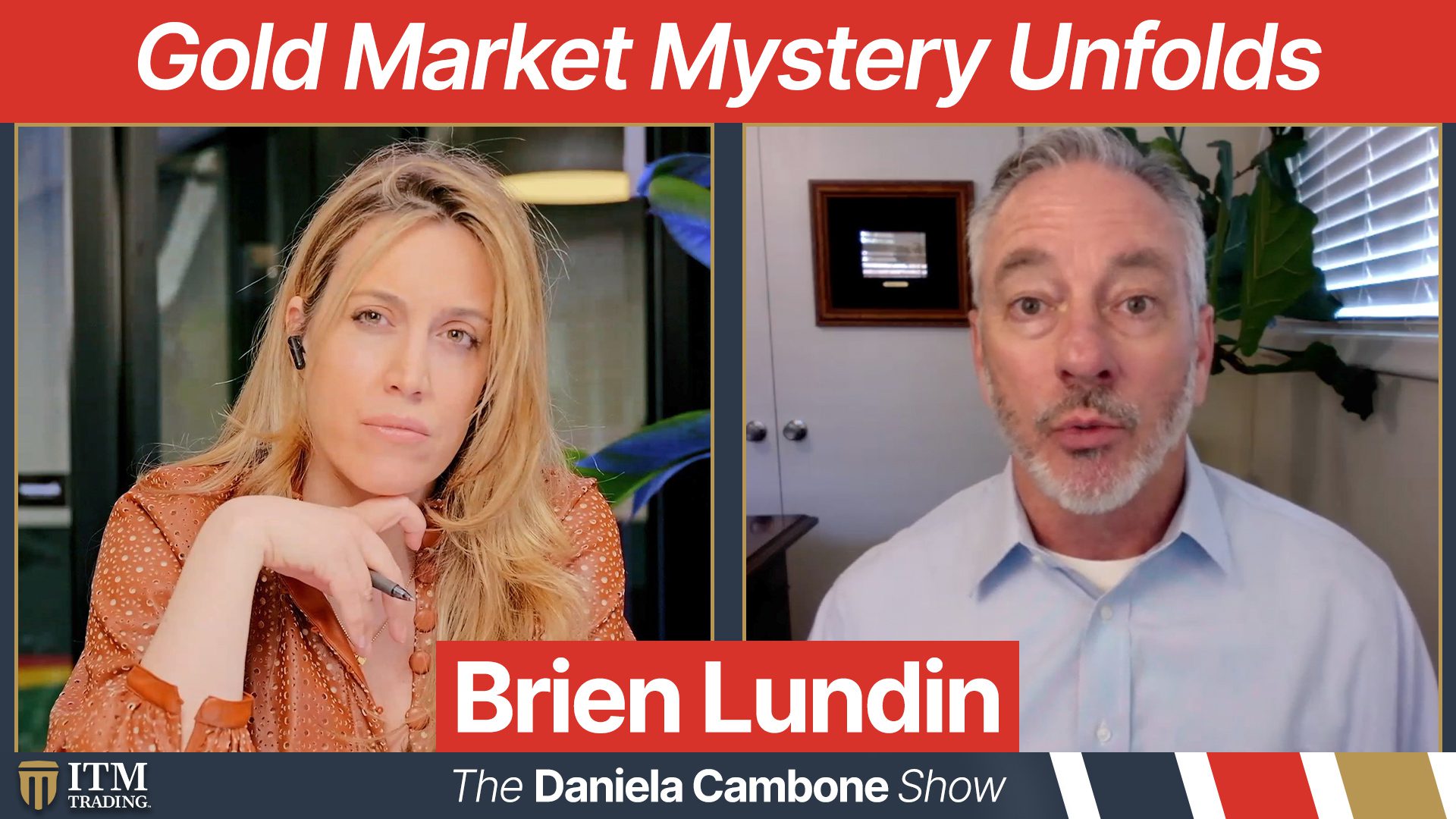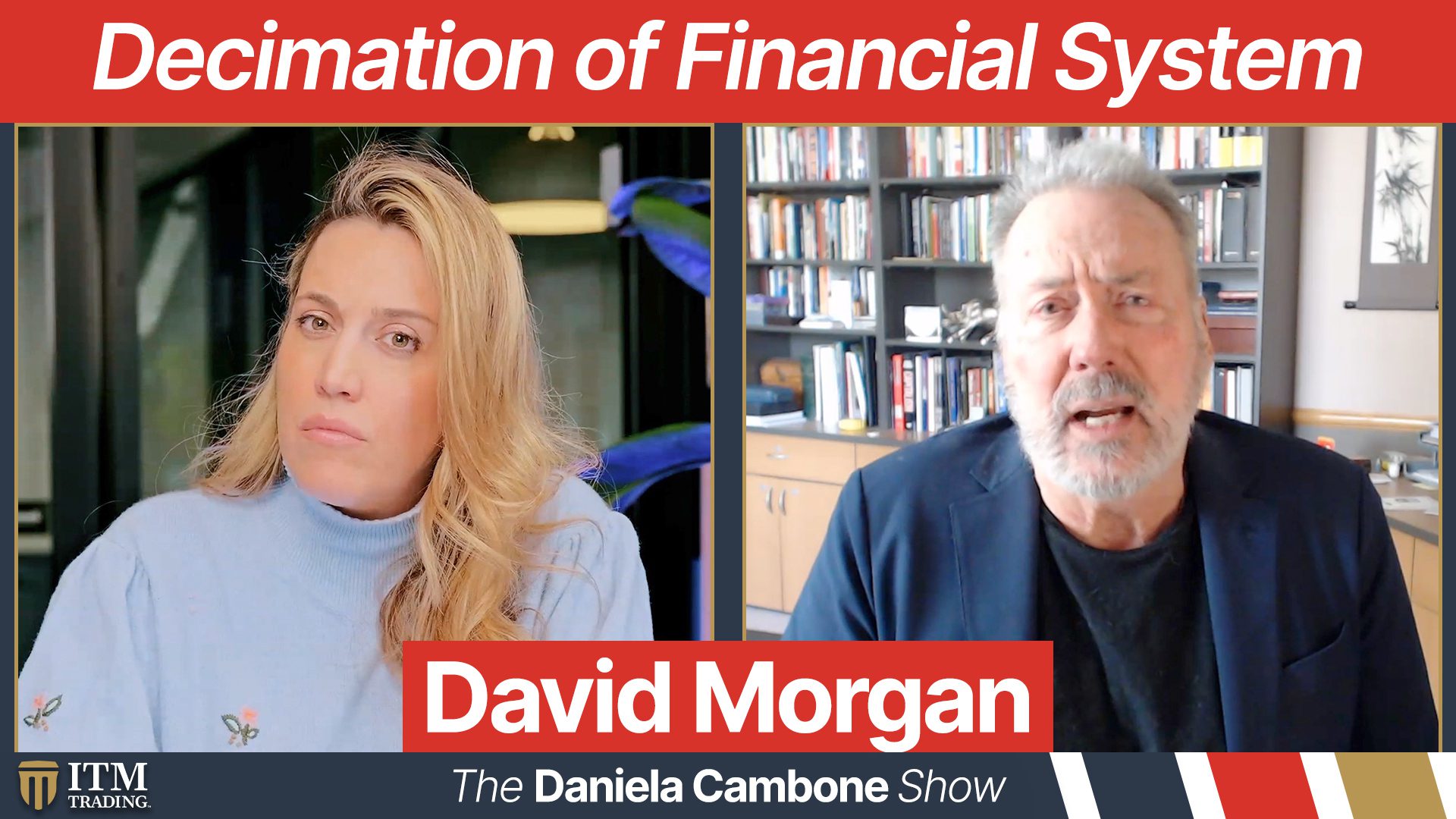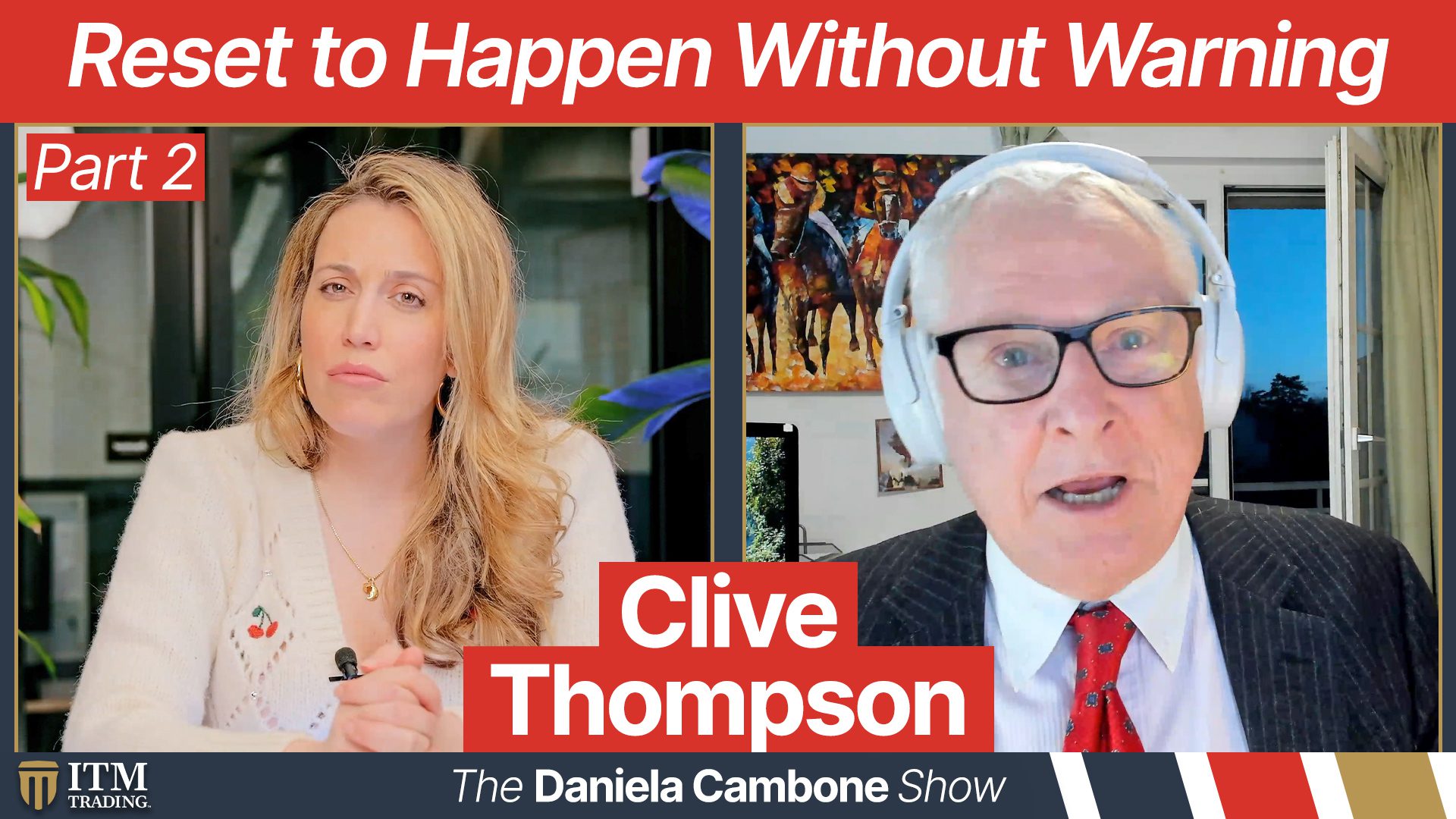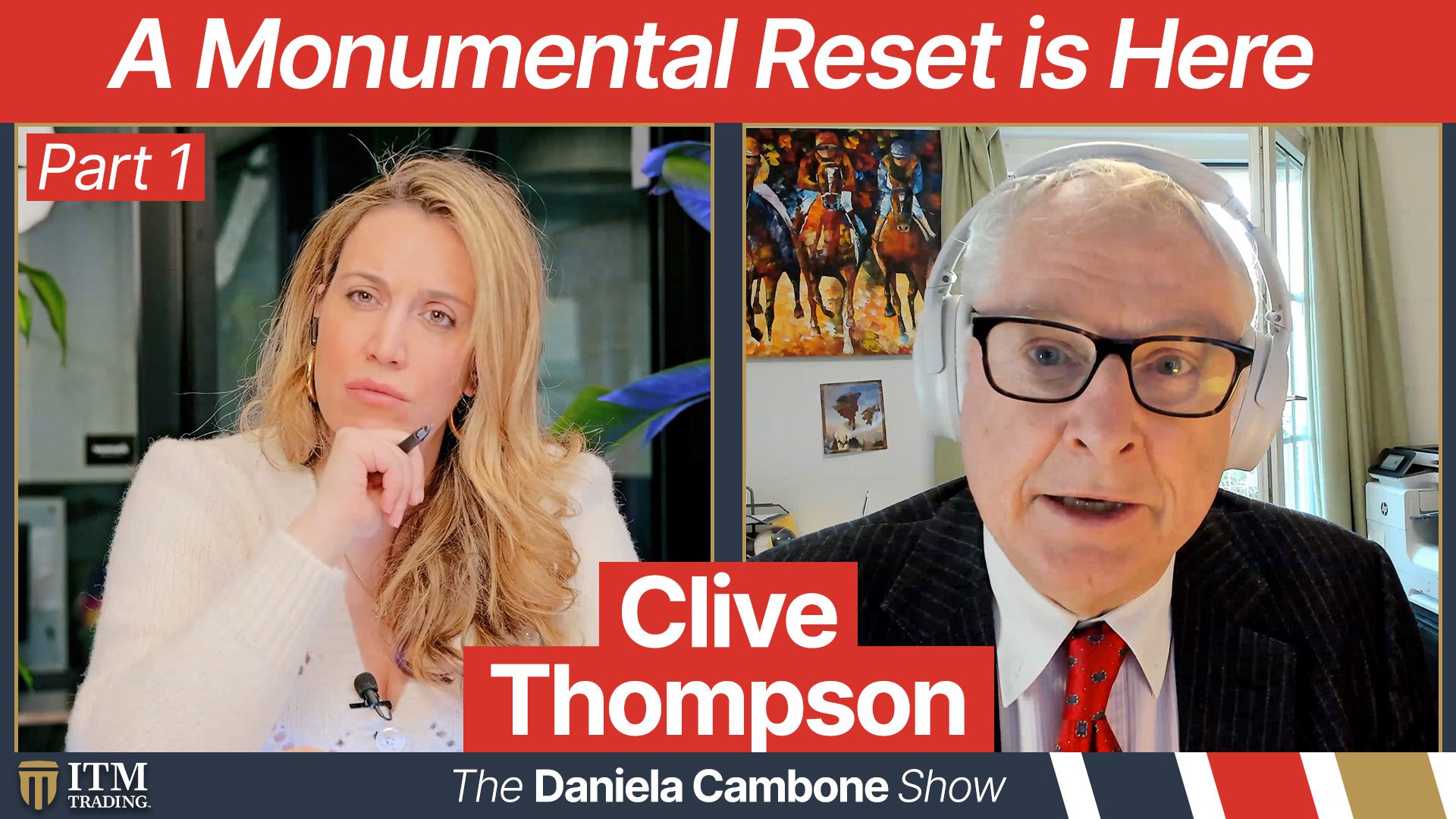We’re On the Cusp of Civil War and WW3; “Facing Real Risk,” Warns Pentagon Advisor
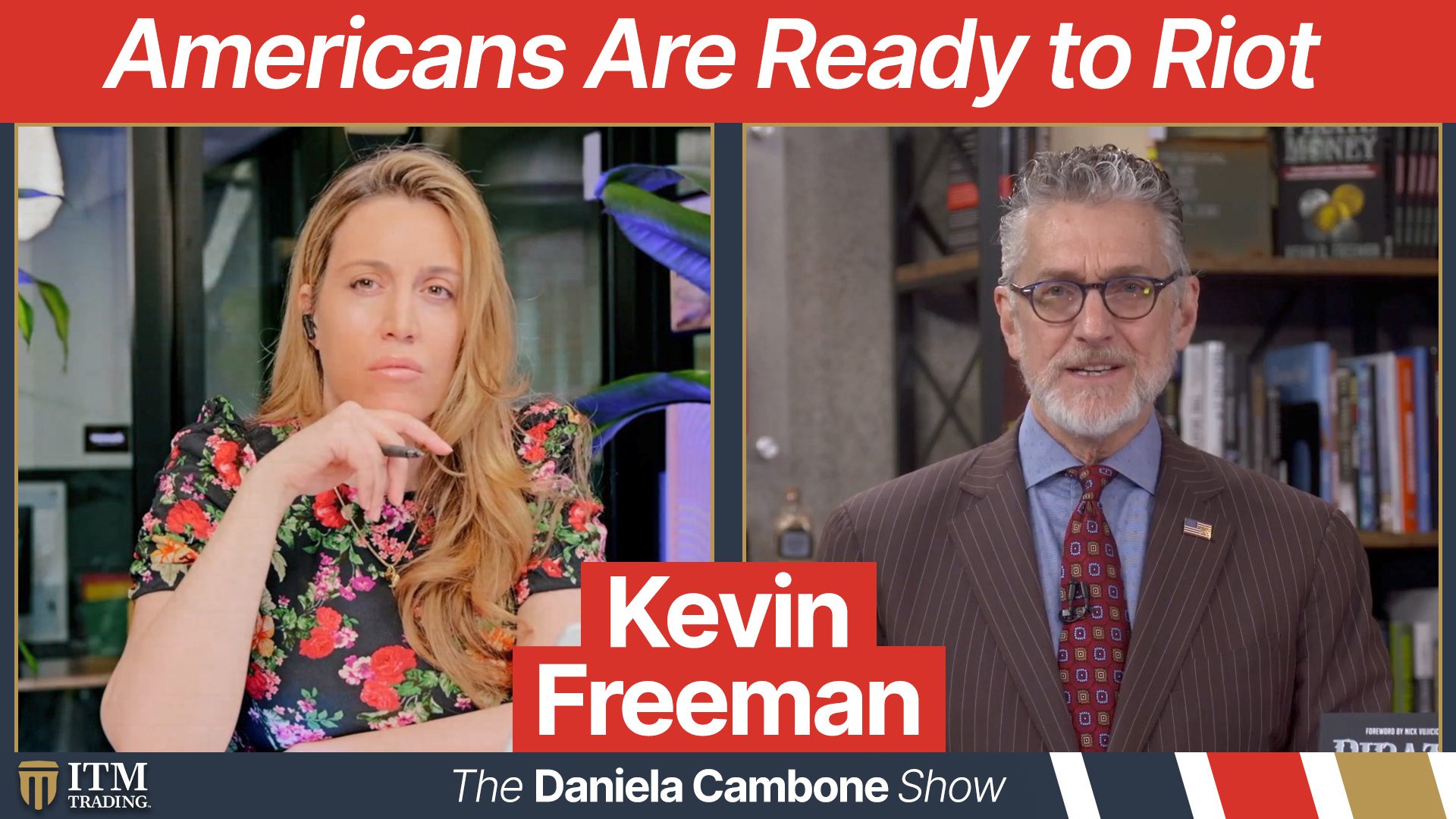
“We’re on the cusp of either a civil war or World War III. We don’t have to go there, but that is what we’re facing as very real risks,” warns Kevin Freeman, host of Economic War Room. In the conversation with Daniela Cambone, Freeman lays out five undeniable truths from his book “Pirate Money.,” including our perilous national debt and the fading dominance of the U.S. dollar. “The currency has a date and an expiration date on it… other nations are working toward that end as we speak.” He also advises every individual to have the option of having transactional gold and silver in addition to their physical holdings of U.S. dollars in the bank.
CHAPTERS:
00:00 National debt
3:14 Could Americans handle debt?
4:50 BRICS
9:20 The possibility of China and Indian currencies
12:34 Inflation
15:16 How far are we from riots?
17:00 Election
20:11 CBDC
25:50 Crisis looming
28:33 Money is changing
29:50 Gold/silver
34:11 Gold confiscation
37:27 WW3
TRANSCRIPT FROM VIDEO:
00:00
Inflation creates a wealth gap. How far are we from revolution breaking out, from riots breaking out over it? When we have produced excess money relative to the growth of the economy, you have inflation. That’s a bottom line.
00:13
Economic truth, one of the effects of leaving the gold standard in 1971 is the financialization of our economy. We used to be a primarily manufacturing nation. You hear the term great reset. Oh, that’s just a conspiracy theory from conservatives. No, Klaus Schwab, the head of the World Economic Forum, is describing why we must have a great reset. You can go to World Economic Forum and look at their videos. It is the year 2030. And you own nothing in your house.
00:43
happy about it. There are no real borders. The United States isn’t a leader. It’s just one nation among many nations. It’s a brilliant future, they think, that they’re going to apply to the rest of us, whether we like it or not. I’m the one who helped teach the Pentagon how to use economic weapons. Central Bank digital currencies is an enormous part of making that happen. Are you optimistic that we can all rise up and say, we don’t, we don’t want it? They will absolutely take advantage of a crisis once created. We saw that with
01:13
you
01:20
Hi, this is Daniela Cambone and welcome back to the Daniela Cambone show here on ITM Trading. Well today, my guest is sounding the alarm on America’s ballooning national debt, which now nears a staggering 35 trillion. He says the country is weeding into fiscal quicksand and there are five undeniable truths we must know about. So please welcome to the show Kevin Freeman.
01:46
He is considered one of the world’s leading experts on financial terrorism and economic warfare. He has written extensively on the subject, including his bestseller, Pirate Money. He’s also the host of Economic War Room, which you can find on economicwarroom.com. Kevin, how’s that for an intro? Welcome to the show. Nice to meet you. Nice to meet you, Daniela. Thank you for having me. Yeah. Well, I mean, I read with great interest Pirate Money and…
02:13
I said, you know, we just have to have Kevin on the show. Even though, I mean, your warning is quite dire. I mean, you talk about the national debt extensively. You say in the first 221 years of our nation, we accumulated 10 trillion of borrowed debt. In the last 15, we’ve added almost 25 trillion, and the pace is accelerating. You call it a monster out of a sci-fi movie, and basically, see no way out.
02:41
Well, I do see a way out, but you’re right. If America is an empire, and a lot of people think and want America to act as an empire, empires last between 200 and 250 years on average. And so America’s nearing the end of its empire status. I don’t want America to be an empire. I want America to be a collection of states operating under the United States Constitution as our founders intended. That, I believe, is the way out. But if we stay on this path where we’re the empire of the world, no, we’re doomed.
03:11
So you say there’s five undeniable truths that we must know about, right? So if you don’t mind, I’d love for you to walk us through them, right? The one, the first one being centered around national debt. So talk to us about them.
03:30
Yeah, undeniably, undeniably, the fact is we have $35 trillion in debt. I wrote the book Pirate Money that you referenced, you said you’d read. In Pirate Money, it was on June 24th of 2023, I looked at the total U.S. federal debt, and it was $32 trillion. It’s gone up $2.5 trillion just since last June. That’s unsustainable. So, the first undeniable truth is our debt path is unsustainable.
04:00
Jerome Powell, the head of the Federal Reserve, says, what is our debt path? It’s unsustainable. Mr. Powell, they ask, you know, in the Senate, they said, Mr. Powell, what is our debt path like? He said, it’s unsustainable. Well, are you just now coming to that conclusion? He said, no. It’s a historical fact. It’s an honest fact. We’re looking at it. We cannot continue on this debt path. That is the first undeniable truth. Office of Management and Budget says it. So does the Congressional Budget Office.
04:29
every economist in the world worth their salt. So what do you say the counterpoint? Because I’ve had, you know, experts on the flip side saying, look, if America really wanted to wipe out their debt, they could. There’s enough tax money coming in, like CPAs drawing the charts for me. I mean, I still don’t believe it because I think the numbers just insane. I mean, what is your response to that? I mean, could America handle it?
04:55
Well, all right, so now you’re talking about raising taxes. Politically, is that possible? Or you’re cutting Social Security and Medicare. Politically, is that possible? I mean, just Social Security and Medicare, according to the Congressional Budget Office, will add $100 trillion to our debt over the next 30 years. That’s just fact. In fact, not only that, but you look at a Heritage Foundation that put out the Daily Signal, and they said if you took just the mandatory spending in Congress, just the mandatory spending,
05:24
all existing tax revenues. Mandatory spending would include interest on the debt, Medicare, Social Security, prescription drug benefits, the things that we’ve promised people and are already written into the law. So do we have the political will to make these changes? Would we make these changes without some type of financial crisis? It doesn’t matter what you say, the bottom line truth is the debt path we’re on is unsustainable. You’ll either have to make major changes by, and I wrote a report on this for the State of Utah.
05:54
You have to drastically cut spending, which right now would mean that you’d have to cut that mandatory spending. You’d have to drastically increase taxes, which would impact the economy, slow the economy and so forth. Or you have to face the fact it’s unsustainable.
06:11
Okay. Your second truth currency under say siege by other nations. You’re referring to the bricks, right? Which brings up a debate of, you know, whether, you know, the bricks have merit or not. They’re countries keep being added to the bricks nations. Um, so at one point or are they already for you a major threat?
06:33
Yeah, all right. So in 2008, I was working in the Pentagon. I was a consultant and I was telling admirals and generals that the BRICS had been formed and it was not just a Goldman Sachs investment idea. I mean, at the time it was being sold to us like Fang or the reason AI stocks. Oh, BRICS, this is the new place we can invest. And I said, no, the origin of BRICS comes from Vladimir Putin himself. I’ve showed them the original writings that said that he was going to perform a coalition of nations that were emerging nations.
07:03
that would ultimately challenge the dollar as their primary purpose. Now the Chinese didn’t get involved really with that purpose until Xi Jinping came to power in 2013, and then other nations didn’t come on board until more recently. But the fact of the matter is that the dollar is becoming less and less interesting to foreign nations, either because they’re opposed to our policies, or because they see our economic situation, or they see what Elon Musk said, which was very clear.
07:33
your currency enough times other countries will stop using it. So just imagine Putin going to India, who’s an ally. And India says, well, we’re allies of America. We’ll use the US dollar. We don’t need to do anything else. And he says, well, you know, during World War II, the allies of America included China and the Soviet Union. And the enemies of America were Germany and Japan. Things change. And by the way, they just took our stuff when they sanctioned us over Ukraine. How do you know they won’t take it?
08:03
your stuff to India if you don’t toe the line according to whatever policy Washington has. So India says, you know, you’re right. There’s no reason that when I do trade with China or with Brazil or any other nation that I have to exchange my currency for U.S. dollars and then exchange it back when we do the trade back into my currency. Why not just do inter-currency exchanges?
08:27
That’s a very logical argument. It has less friction. Over time, it will carry weight. People will no longer put their reserves in US dollars exclusively. When I started talking in the Pentagon, China held 10% of our outstanding foreign debt. Today, that amount is approaching 2%. It’s fallen below 3% and it’s headed towards 2%.
08:48
Other nations do not intend to continue financing our debt. And you go back to point number one, we’re gonna need a lot of money, 100 trillion over the next 30 years, in addition to the debt that we have today. So yes, other countries are targeting our currency and say, we could replace this with a digital yuan, or we could replace it with just exchanging between our currencies. Both, most arguments against this concern are, yeah, I know the dollar’s bad, it’s weak, but it is the cleanest dirty shirt in the long run.
09:18
Well, at some point you pick up the shirt, it smells too bad, you can’t even wear that. At some point, even the husband whose wife’s been away for three months, I can’t wear this anymore, it’s disgusting, it’s tearing. So at some point, the dollar will go down. I’m not saying it’s going to happen today, this year, next year. But no reserve currency lasts forever. That’s just a fact of life. And anybody who believes the myth of dollar permanence is fooling themselves. The currency has a date.
09:48
and an expiration date on it. I don’t know exactly when it will no longer be the primary reserve currency of the world, but other nations are working toward that end as we speak. When you say you don’t have a timeline, I mean, would you be surprised if it happened within the next 10 years? No.
10:08
And in fact, Heminway wrote, maybe it was in the Old Menacee, there’s a famous Heminway quote, how does one go broke? And the answer is very slowly than all at once. And that’s what will happen to the United States. We’ll have a bad, really bad Treasury bond auction, really bad. And all of a sudden people will panic. All financial panics start that way. And as Jamie Dimon famously recently said, it always feels good until the crash. Let me ask you this, Kevin.
10:37
What about the argument that, okay, the BRICS is a great concept and philosophy, but at the end of the day, you’re never going to get China and Russia to agree on a common currency. I mean, they’re going to be vying to be at the top, and I will probably add India in there. How are you going to get them to agree? Well,
11:02
Number one, eventually people can come to agreement. We didn’t expect a euro would ever happen, but now we have a euro, and they were tremendous enemies fighting, France and Germany, for example, two of the largest in the European Union, and now they have a common currency. So it can happen. You can’t say it can never happen. But number two, right now they’re operating with a common enemy or a common adversary. And so it doesn’t mean that they have to succeed
11:32
replacing the dollar with their currency, it just means that they’re undermining the dollar as the universally accepted currency. And we’ve lived under that exorbitant privilege since Bretton Woods back after World War II and even after Nixon took us off the gold standard. Kevin, before we move on to point three, just one more thing I wanna bring up. I mean, the United States must be, obviously the government is aware, right?
12:01
and seeing that the BRICS is growing, they’re talk of a unified currency, what could be the counter playing card that the US could use to stop it?
12:11
Well, we use diplomacy. We use military power. You know, there are some people, I’m not sure I believe all of this, but every time the dollar’s been challenged, like by Gaddafi, then the United States finds a way to undermine Libya. And, you know, we have to remove Gaddafi. The one dictator of the world who gave up nuclear weapons when we asked for, asked him to do it, you know, and he’s gone. I don’t know if that’s conspiracy theory is true or not.
12:41
and we will use it to maintain as much authority as we can. The problem is, is that we’re abusing that authority in the minds of many other nations. And so every time we use an economic weapon, and by all means, I’m the one who helped teach the Pentagon how to use economic weapons. I was the primary economic warfare consultant for groups within the Pentagon, including the Defense Intelligence Agency and others, and I was telling them, hey, look, these are powerful weapons, but you can’t abuse them.
13:11
them. And every time we turn around and throw another sanction on, the other nations start to learn from it. So our sanctions have been less effective against Vladimir Putin than we expected them to be in the Ukraine war. Part of it is because he knew to build up gold stocks. And so The Economist magazine and others have been talking about how the gold supply in Russia has been their counterbalance to American sanctions. Bottom line is, we will use our
13:41
And we will need to gracefully find ways to minimize the use of it so that we’re not abusing it and causing more anger by other nations. Undeniable truth number three revolves around inflation. We heard it from Powell himself. It’s nowhere near under control. Kevin, your thoughts.
14:04
Yeah, well, inflation and the cancel on effect. And I quote a French economist from the 1750s who wrote, basically, I’ll summarize it. He said, if you’re close to the King of France and he’s producing lots of money, you will tend to benefit more than those who are further away from that. And that’s true. So it’s true in the United States. We produce a lot of money in Washington and New York. And people who are close to live in Washington and New York, they find lots of benefits.
14:33
I had a friend who was the car dealer for 21 car dealerships in Washington, D.C. And so every time there was a new administration, people would come to down, they’d sell cars. They didn’t haggle over the price. They bought them at full price. Money is flowing in Washington. But you get further away from it, and that money doesn’t flow as freely. That creates a wealth gap. Inflation creates a wealth gap. When we have produced excess money relative to the growth of the economy, you have inflation.
15:03
That’s a bottom line economic truth. It doesn’t show up all at once necessarily. It doesn’t show up linearly, but it does eventually show up. And you create more money than you have. So you can go back to 1971, when we left the gold standard. You look at the debt that increased from August 1971 to the present, and then you look at this consumer price index from the Federal Reserve, and the charts match up almost perfectly, almost an exact correlation.
15:31
Excess money production creates inflation. Inflation harms the poor more than it harms the wealthy, because the wealthy can buy assets and protect themselves. They can hedge. They can do all kinds of things in an inflationary environment that the average person cannot do. Wages don’t move linearly with the inflation rate. So bottom line is, is that when you have excessive inflation, which they had in France in the 1750s and 1760s and 1770s,
16:01
it eventually leads to destabilization like the French Revolution. So you have Marie Antoinette saying, let them eat cake. Peasants have no bread. Well, let them eat cake. And then you have the head of Kellogg’s cereal come out recently and said, you know, you can eat cereal for dinner because you may not be able to afford the full meals that you’ve had. So cereal is a good option. It really is smacking of this in the heartland of America. Inflation is hurting real people in real ways.
16:31
is leading to a wealth gap and destabilization. So at what point are we at? I mean, how far are we from revolution breaking out, from riots breaking out?
16:47
Well, we had riots happen during the pandemic, right? So we had riots. I don’t know what sparks them. I can tell you from an economic warfare perspective, the Chinese wrote a book titled Unrestricted Warfare. It was published in 1999 by two senior colonels. So I’m going back to what I know, which is economic warfare, and they list street riots and the political crisis as their primary end game weapons for tearing down America if they want to
17:16
undercut America’s economic strength for whatever reason. So are they ready to prepare to do that? Well, I don’t know. If we go into a war or conflict over Taiwan, if we get into a trade war, or if we get into a war, these are weapons that they intend to use. So how do you get a street riot? You spark it. It’s a flame. How does it happen in the Middle East? Remember when we had the Arab Spring? That happened over food inflation. That’s what the beginning was. And you can go throughout history and you can find that if you have massive food inflation
17:46
people can’t afford to eat. That’s when you have rights. How close are we? I don’t know, it could happen this summer. It depends on what happens in the economy. It depends on if people feel they have a voice. It depends on the election. A lot of things will spark those clashes of civilization and culture, but the average American is feeling pinched and they feel like they’re losing the American dream. At some point, they will be ready to riot. And that’s what people are worried about. That is a serious concern of the establishment.
18:16
I want to move on to point four, but first you just, you know, you think of so many of the points I want to just pick your brain on. I mean, when you mentioned the election, do you think economy will be the main card to be played, the top of mind, or is it immigration? Is it, you know, the war in the Middle East? Is it economy for you you think that’s going to really decide the winner of the election?
18:43
Most elections are defined, as Bill Clinton said, it’s the economy, stupid. And you keep in mind when that election happened and we had Saddam Hussein enter Kuwait and George H.W. Bush was very popular, super high popularity, but he seemed out of touch with the economy. Remember, he went to a grocery store and didn’t know how a scanner worked and that really hurt him with the people. So in the end, the economy matters. But immigration is an economic matter.
19:13
Imagine you’re in a less affluent community and you’re finding that you’re losing your job to someone who recently came across the border. You’re going to be upset about that. Or imagine that the inflation that you’re feeling is because we’re sending a lot of money over to the Ukraine, which you don’t understand exactly why we need to defend the Ukrainian border, but we’re not defending the American border. So you get frustrated and upset. Why? Because it’s hitting you economically.
19:43
If you’re really well off, those issues don’t matter to you. In fact, if you do a poll of how important Ukraine is, just do a stratification based on income of the individual you’re polling. I guarantee you those at the higher income levels will in general say, oh no, we have to fight in Ukraine. We’ve got to stop this bully Putin. You start talking to people who are losing their jobs or paying too much for dinner. They go to McDonald’s and it costs them $20 instead of $6. All of a sudden those people are going to say, why in the world are we
20:13
sending billions of dollars over there. That makes no sense to me. It is all economics at some level. And to your point, Kevin, there’s just such a gigantic disconnect now, right? It’s like what happened? Like, you know, many people have pointed out there’s there’s really no more middle class, right? They’ve pushed the middle class out.
20:32
Yeah, no, the Pew Research Center has done study on this, and this is one of the effects of leaving the gold standard in 1971. It’s the financialization of our economy. We used to be a primarily manufacturing nation, but when we unleashed our money supply from any semblance of a gold standard up to 1971, for every dollar that was produced, 40% had to be held in gold. We unleashed from that, and when we separated from that, we started to financialize everything. That’s when all the derivatives
21:02
So we’re talking quadrillions in derivative exposure, and it’s all gonna settle out somewhere in some way, but we’re now making money off money rather than making money off manufacturing, which goes back to the Cantillon effect, which if you’re close to the money supply creation, you can make money off money. If you’re further away, you have to make things and make stuff, and this economy is geared to benefit those who financialize it rather than those who manufacture it. Exactly.
21:32
Okay, let’s get to point four. This is a topic we cover in depth central bank digital currencies You say governments weaponizing currency through CBDCs is coming, you know It’s interesting Kevin how just a few years ago central bank digital currencies if you spoke about it be like it’s a conspiracy theory Never gonna happen and then look at where we are today
21:52
you know, all the heads of state openly talking about it, right? Christine Lagarde coming out with a New Year’s message saying, we can’t wait to usher in the digital era of the euro. So talk to me about your thoughts on central bank digital currencies, the dangers you see, and how far we…
22:10
How far away are we from this reality? Okay, CBDC, why I say this is an undeniable truth is because the digital Yuan exists. The Chinese have weaponized their currency already with the purpose of this. But you go beyond that and you see 110 nations or something are creating some version of it. Some will succeed, some will fail, some are a joke, some are real. President Biden, in March of 2022, issued Executive Order 14067.
22:40
32 pages I think or 37 pages in length. You can read it, it’s a pretty easy to read order. And it’s got a very benign topic name to it. The topic name is something like a study on digital currencies. But when you read the order, it requires that people begin to study how to implement a digital currency that will have some components to it. Components like diversity, equity, and inclusion, and ESG.
23:10
Things that among the wealthy seem popular and good things, but you go out again to the heartland of America and they say, wait a minute, I don’t understand why you’re implementing these policies that are hurting us. For example, Mississippi is suing BlackRock for fraud because they’re implementing ESG and DEI. These are things that are inherent in central bank digital currencies. The beauty of them according to the people creating them
23:40
what people do with their money. So when they had the G20 summit last September, I believe it was.
23:48
at the G20 summit, they had a spokesperson come out and say, tell us what you brought for us. What’s it gonna mean? And she really happily, on Indian television, explained, well, it’s so exciting. Imagine, I’ve had two cups of coffee in the morning, I stopped by the coffee shop and I bought two cups of coffee and I go in the afternoon and I wanna sit down and I wanna buy a third cup, but my digital money knows I’ve already had too much caffeine that day and it denies me the ability to buy caffeine.
24:18
I could be cut off for my own good, isn’t that wonderful? These are the same people in New York who said, go Mayor Bloomberg, I only want 16 ounces of soda, don’t let me get refills. This is the nanny state where you don’t own the money, where the central bank or the issuing bank owns the money and they control it. It is different from electronic currency. Everything we do is pretty much electronic today. Right, right. But this is different and I had the explanation, this is like every time you use your dev,
24:48
It has your fingerprint on it, and they know exactly who’s spending, where spending, what they’re spending on, what they’ve already spent on, what they’re going to spend on. And so they could limit. You have a gas-powered car? Danielle, you’re not supposed to have a gas-powered car. You can only have 20 gallons of gas a month, and your card will stop you. When you hit 20 gallons, it’ll shut off. This is the ability for government to take control. The problem is, is that not all the American people believe in the exact same ideals that
25:18
That’s why you see a lawsuit coming out of Mississippi against BlackRock. You see Texas saying, hey, stop implementing your anti-fossil fuel programs here because Texas is an energy state. You see a pushback, but the federal government, central government, central bank, digital currency will be one sided to implement just like it is in China with the social credit scores that they’ve applied to the digital yuan. Exactly. And thank you for highlighting that.
25:45
difference when you get the pushback. Well, you were already using debit cards and visas, but it’s not at all the same thing. Do you think that they need to create a crisis? I mean, we often hear experts saying they will create a crisis that will then usher in the central bank digital currencies, or do you think they’ll do it regardless, that this is the path we’re on? Well, both.
26:10
I don’t know that they think they need to. A crisis is inevitable. That was our point number one. We’re going to run into a debt crisis. And you know, you hear the term great reset. And somebody recently said, oh, that’s just a conspiracy theory from conservatives. No, Klaus Schwab, the head of the World Economic Forum, you know, in his thick accent is describing why with the pandemic, we must have a great reset. And he says it himself and he defines what great reset is.
26:40
economic forum and look at their videos. It is a year 2030 and you own nothing and you’re happy about it. There are no real borders. The United States isn’t a leader. It’s just a one nation among many nations. You’re going to eat a whole lot less meat. We’re going to 3D print organs for you. It’s a brilliant future they think that they’re going to apply to the rest of us whether we like it or not. And so central bank digital currencies is an enormous part of making that happen. There will be a crisis fina-
27:10
will have a run on banks like Silicon Valley Bank or whatever. There’s going to be a fiscal crisis where it’s inevitable or they could manufacture a crisis. And I’m not going to accuse people of manufacturing a crisis, but I will say they will absolutely take advantage of a crisis once created. We saw that with the pandemic. Do we have the possibility to stop it? If people wake up to the dangers of a central bank digital currency?
27:39
Are you optimistic that we can all rise up and say, we don’t want it?
27:46
Well, I think it’s entirely possible, but I wouldn’t bet my entire future on that happening naturally. I think people will complain about it. There will be pushback. There was a whole lot of pushback on a lot of liberty challenges, including, you know, I don’t care which side of the debates you’re on. The reality of it is there was a vaccine mandate. Everybody had to take it. And then there was a pushback and the pushback was effective. So it doesn’t matter where you are. Yes, people can stand up and raise their voice.
28:15
doesn’t guarantee, however, just because they do that, that they’ll be effective. That’s why I wrote the book Pirate Money, which goes to point number five. Undeniable truth number five is money is changing. It’s changed multiple times and multiple ways, and it will change even more in the future. And, well, I don’t know, do you wanna go in more depth on point five before we talk gold and silver?
28:40
Oh yeah, I’d love to say I’ve got, I’ve bought as collectibles, I’ve bought large print dollars that used to be this big that were issued by individual states. I’ve got currency, American currency dating back to 1776, a continental note. I’ve got a Spanish mill dollar. I’ve got gold coins. I’ve got a Bank of Kentucky 12 and a half cent note. All of these are the history of money. It’s
29:10
ways. Now you can take your phone and you can tap to pay for something. Like I went and bought our gasoline at the pump and I just, actually I just took my Apple watch and I tapped my Apple watch up there and I filled the tank with gas. You can Venmo and Zelle and PayPal. Money is changing in multiple ways and it will continue to change. That is an absolute fact. It is undeniable truth and it’s either going to change to central bank digital currency or it’s going to change to something else or a combination of things. I’m hoping for at least one.
29:40
least a combination of things. In your book, Pirate Money, you outline a path forward that would see gold and silver become not just valuable commodities, but practical everyday currency, shielding citizens from the consequences of a potential monetary collapse. Talk to me about how you see gold and silver as, can I say, the ultimate solution, the only solution?
30:06
Well, I’d say it’s the only constitutional solution we have to the mess that we’re in. Back in 1776, I have a Philadelphia printed continental note that says that Bearer is entitled to exchange this for four Spanish milled dollars, which were silver,.7734 troy ounces of silver, or the value thereof in gold and silver. The problem was they didn’t have any gold and silver behind it, and so Washington’s
30:36
shoes. They were freezing because Washington himself said all this printed money, a wagon load full of continental notes, would not buy a wagon full of supplies because there was nothing behind it. So, gold and silver became then, after we left that and the Orders of Confederation, we went to the Constitution and the founders said, we’re going to make real money, a dollar. And when they said a dollar, they didn’t mean a piece of paper with George Washington.
31:06
picture on it. They meant a Spanish milled dollar, a real piece of silver that could be cut up into eight slices, pie-shaped wedges known as Pieces of Eight.
31:17
and they talked about silver coins and gold coins and they meant Spanish mill dollars or pieces of eight and the gold coins were known as doubloons, another Spanish term. And if you hear gold doubloons and silver pieces of eight, you think pirate money. So I wrote the book Pirate Money to give us the answer from the Constitution, Article I, Section 10.
31:40
The founders hated paper money. Jefferson said paper is poverty. Washington said paper has had the effect it’ll always have. It’ll ruin your commerce. It’ll destroy your state. Even the founding father, Alexander Hamilton, the bank, the first bank, first treasury secretary, he said paper is terrible. Even the father of the Constitution, James Madison, said paper money is unconstitutional. Well, that’s what we’re left with
32:10
paper money, but in the Constitution they said the only legal tender should be gold and silver coins. It says a state may make nothing other than gold and silver coins legal tender. The problem is, is not many people have gold doubloons and silver pieces of eight, and even under the coinage act of 1857, those who are outlawed to be used as currency, but they don’t have American eagle $20 pieces. People can’t really live and spend money with gold and silver coins.
32:40
idea of the founders in 1830s the Bank of Kentucky would take those gold and silver coins on deposit and issue out certificates notes that were backed by real gold and silver challenged in the Supreme Court in a case called Briscoe versus Bank of Kentucky in 1837 and they issued them and they traded like currency and the court said as long as you actually have the gold and silver and keep it and never fractionalize it never lend it out you can have that as
33:10
just took that, turned it electronic, just slapped a debit card or an electronic means of exchange on top of an existing gold and silver supply like Texas has in the Texas gold in the Texas bullion depository. So I could go to Texas and I could say, hey, I want you to hold $10,000 worth of gold, which is a little less than five ounces, and I want you to keep it there in the form of gold. I don’t want you to lend it to anybody. I don’t want you to do anything with it except hold on to it.
33:39
it until you receive electronic instruction from me to transfer it from me to the supermarket. And at the supermarket, they have a choice. They could either take it in the form of gold or they could have it converted to U.S. dollars and they could be paid in cash. And what if we added to that technology capability to where the bullion depository could actually buy gold on your behalf and sell gold on your behalf at the smallest possible market, maybe a half percent? Well, guess what?
34:09
today. Kevin, so when you’re talking these coins, I mean, is this different than pre 1933s? Yes, well, I’ve got some pre 1933 coins, which is pretty cool. Everybody should have some physical gold and silver. Right, so I ask you, do you own those because are you concerned about the risk of confiscation? Do you see gold confiscation coming back one day?
34:36
Well, I suppose it could, but if you read the confiscation order, you know, the funny thing is people talk about that all the time and I decide I’m going to sit down and read the executive order from FDR and see what he said. What he said was essentially this, people are hoarding gold and they’re not transacting in it, they’re not spending it. And because they’re hoarding gold and holding onto gold, it’s hurting our economy. And that would be true. If everybody took every dime they earned and put it in gold and buried it in a safe, the
35:06
But what we’re talking about is making gold transactional. But we’re not doing it, the book Pirate Money argues that it should be done at the state level and making it transactional under the Constitution. So number one, I don’t think that the executive order, they could confiscate gold held by a state. Article 1, Section 10 is very clear. There’s another Lane County versus Oregon. There’s Bronson versus, there are a lot of court decisions that say that they could not confiscate the gold held at a state.
35:36
Secondly, if you obey the order, then what we’re doing is perfect because we’re making gold transactional. We’re taking it out of the vault and getting it back into the economy, doing the exact opposite of what the order was designed to stop. So no, I think if we enact pirate money legislation, we will not have gold confiscated. Kevin, you know that the Bitcoin cyber hornets are going to say, why don’t you just use Bitcoin?
36:02
Well, you know, Bitcoin is great. Things I love about Bitcoin, here they are. I love the fact that Bitcoin is limited in supply. Only 21 million will ever be mined, which means that it’s going to itself retain value. I love the fact that it is infinitely divisible.
36:20
And I love the fact that it’s private, that not everybody knows my business of what I’m doing. All right, the governments hate the fact that it’s limited because governments have all this debt and they want to spend more money than they take in in taxes. So they hate Bitcoin and they hate the fact that it’s private because they want to implement central bank digital currency. So what they say is we’re going to give you our own version of Bitcoin. It will be a central bank digital currency and it will have this fractionalization and it’ll be beautiful and you’ll love it.
36:50
supply, they ignore the privacy. So I’m a fan of Bitcoin as a result. However, I don’t think governments are ever going to make it currency, and under the Constitution, a state can’t make it currency without a constitutional amendment. So if you’re a Bitcoin fan and you don’t want to use gold and silver, here’s what I’m going to tell you. Go get a constitutional amendment, take it to two-thirds of the states and get it passed by two-thirds of the Congress that allows states to
37:20
the idea of pirate money because it’s already in the Constitution and we can do it now with simple legislation at the state level.
37:31
A lot of people watch the show prefer owning gold than having their cash in the banks, especially with the banking crisis and they’re concerned about holding cash in the bank. Your thoughts on that concept? Yeah, I think that- I guess the question is, sorry, how much gold versus cash should you have, physical gold?
37:55
You know, I don’t know how much physical gold an individual should have. It depends on how old they are and all this. And I certainly don’t give investment advice, even though I have a CFA designation, even though I’m a registered investment advisor. I have no idea who’s watching. So I don’t know what’s appropriate. But I know that I keep cash, and I also have cash in the bank. The problem with banks that people are worried about is fractionalization and bank runs. And they’re worried that the money’s been lent out.
38:25
state, the state would not be allowed to loan it out. They would have to hold the gold. It would have to be audited regularly. It would have to actually physically be there. So how much do you want to keep at home versus how much you want to have available to you? Every individual would need to make that decision. I wouldn’t suggest you go away from the U.S. dollar either, because, you know, like I said, nations go bankrupt very slowly than all at once. For a long time period, your dollars may be very good, very useful, very helpful to have.
38:55
ought to have the option of having transactional gold and silver in addition to their physical holdings and in addition to their holdings of U.S. dollars in the bank and personally. Kevin, just to wrap here, given all your experience working at the Pentagon and covering warfare and economics, we promised we’d end on a beautiful, harmonious note, but…
39:21
Before we get there, I just want to ask about the risk of World War Three for you. I mean, we now have the director of Russia’s most powerful security agency saying this week that he believed Ukraine, along with the US and Britain were involved in the attack.
39:34
on the concert in Moscow. Could that be a reality for you, World War II? Well, if you look at the history of where World War I started, and it was the assassination of an archduke, and that started the bloodiest war known, the Great War, the one, war to end all wars. If you look at that history, of course it could happen, whether it’s a false flag operation or something real, or whatever the cause. People died, and that’s a rallying cry, remember the Alamo, for people to stand up and start a war.
40:04
Cusp of War, War III for quite a while. I wrote a blog, I haven’t posted in a long time, but I titled it The Winds of War, and I walked through four very lengthy, very detailed, highly researched explanations. You could put The Winds of War by Kevin Freeman, glob and you could read that. Yes, we’re on the cusp of World War III. We’ve been in an economic war for decades here. The Chinese, Russians.
40:34
Iran, the North Koreans, they’re aiming at us. And then there’s this internal war between the World Economic Forum and the individual liberty lovers who are further away from the creation of the money supply. So yes, we’re on the cusp of either a civil war or a war war. We don’t have to go there. But that is what we’re facing is very real risks.
40:59
Kevin, I’m going to ask you to take it home for us. I mean, I thoroughly enjoyed this conversation. Thank you for your analysis. But if we could end it with some sort of hope and for the audience watching, I mean, given everything happening in the world, how do you keep things bright in your life?
41:21
Well, first off, we came through a horrible pandemic, a really awful, horrible pandemic. And we’re traveling again. The economy’s open. People are able to shake hands and kiss on the cheek and hold and hug. That’s a wonderful thing. For another thing, we still have liberty. And we have 50 states, and they have different things that they’re doing in the states. So we have a lab experiment going on in the states. We’re still able to vote in elections. The dollar is still the primary reserve currency.
41:51
of the world. America can return to manufacturing which we have so many that we’ve got a lot of natural resources, arable land, farmland and so forth. If we stand up for the liberty concepts that you come emanate from the Constitution we’ve got a great future. Now here we are this is Easter week as we’re recording this and and I’d say for me personally my hope comes from my faith in God and and I think a lot of people have faith in God and I believe that if we pray we’ve been in dire points before like the
42:21
British on the beaches of Dunkirk about to be wiped out and Hitler was going to send speed boats across the English Channel and take over the British island? Guess what? People prayed and there was a rescue from the little ships, the little people who went across that English Channel 26 miles and they picked up the soldiers, brought them home and there was more war to fight. And as a result, Western civilization was saved. I think we’re on the right side of this and I think that if we believe in God and we go
42:51
and we work together and treat people as human beings, we’ve got a brilliant future ahead of us. And I really think that pirate money, if people will read this book and they can get copies at piratemoneybook.com or they can go to economicwarroom.com and see episodes we’ve done on all these topics and many more, or they can go to tran and they can see where 25 states have started the legislative process to bring transactional gold and silver back.
43:21
we can look forward to. Let’s concentrate and focus on the hope and the opportunity. Sure, they’re bad things. Sure, we see problems. So we take a bad, good, beautiful approach. The bad is the problem, the good are solutions, and the beautiful is if we all work together, we can restore liberty, we can restore hope, we can end the cancel on effect and help every segment of our society improve economically and have brilliant, beautiful futures with their families as one nation under God.
43:50
Thank you so much, Kevin. Beautiful words. Thank you for ending on that note. And for those practicing, I wish you a wonderful Easter Monday. We’ll have more great content coming your way. So be sure to stay tuned to the Daniela Cambone show and you can hear more from Kevin at economicwarroom.com. Is that right, Kevin? That is correct. Thank you, Daniela. There you go. And as always, I invite you to reach out to one of my wonderful colleagues at ITM Trading. You can book a Calendly appointment.
44:20
calendar appointment. There’s a description below in the video. And basically it’s a free strategic session where you can go over the topics that we’re discussing. You can go over, you know, what you should be doing with your money and the role that gold and silver can play. I invite you all to do that. It’s really a great experience. That’s it for me. We’ll see you soon.
SOURCES:
https://twitter.com/SecretWeaponUSA
https://www.youtube.com/watch?v=XApz32mscXA
https://www.cnn.com/2024/02/26/food/kellogg-ceo-cereal-dinner/index.html
https://www.youtube.com/watch?v=Pjue92B4Ahs
https://www.youtube.com/watch?v=akLjzTisZoI
https://www.history.com/this-day-in-history/fdr-takes-united-states-off-gold-standard
https://nypost.com/2024/03/27/business/blackrock-warned-for-misleading-statements-tied-to-esg-funds/
